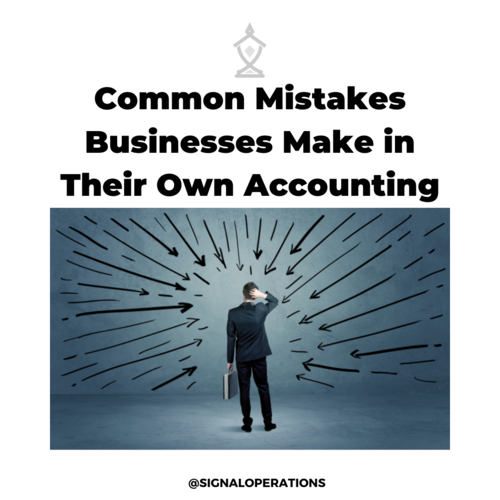Common Mistakes Businesses Make In Their Own Accounting
Accounting can be complicated. It’s not uncommon for businesses to make mistakes, but no one actually wants to make mistakes.
So, how do you avoid them? Here are some of the most common mistakes businesses make in their accounting.
Once you know them, then you can learn how to avoid them!
Throwing Away Receipts
Lots of people toss their receipts out, sometimes intentionally, sometimes not. They’re small slips of paper that are so easy to forget about and crumple into a drawer or bag. Do everything you can to avoid this. As a business, you do not want to throw your receipts out without thinking.
It’s really important to keep receipts, most of all when they’re for business expenses. You might need that information later, especially come tax season. You don’t want to lose track of what you can write off, and you need proof of what you’ve written off in case you’re audited.
“If you’re audited, you will be happy to know that you’ve saved all your receipts. An easy way to store your receipts is to convert them into electronic format so you can easily retrieve them when needed.” - Kinden
If you don’t want to deal with all those little papers, you can always go paperless like we do! Simply scan them into a program like HubDoc. Once they are submitted there, then you can dispose of your receipts.
It can be great for any business to go paperless. Check out my paper calculator to see how much money you could save by going paperless.
Mixing Up Business and Personal Spending
If you mix up your business and personal spending, you’re going to create a big mess for yourself to dig yourself out of when you have to do your taxes.
“Paying for business expenses with your own money can be a dangerous habit and could even cause legal problems in the event of an audit.” - E&E
It’s much simpler and safer for you to open a separate bank account or credit card for your business. This makes your spending far more organized and safer to deal with during tax season. In the end, opening a new bank account, although it seems like a big task, is a much easier thing than dealing with the mess you’ll have made if you don’t!
Not Keeping Detailed Records
Not keeping detailed records can make things a lot messier for you. You may not feel like wasting time making hyper-detailed records of expenses and income and every other aspect of your accounting, but it’s worth it in the long run.
“Without detailed records, things get messy. You’ll find yourself unsure of where this expense came from, why you lost some money on that day, etc. [...] Keep detailed records of everything. It actually makes things more organized when you know where everything came from, plus you’ll be thanking yourself for those details when tax season rolls around.” - Signal Operations
Organization is key to good accounting. Every detail matters and having every detail clearly laid out will always be of use at some point or another, but most definitely during tax season.
Not Having Enough for GST, PST, or HST
Make sure you set aside enough for taxes - which varies based on your income bracket. I usually start at 20% and go up. If you collect Sales Tax, make sure you set aside that money as well - it's not yours to spend!
“Many businesses use their cash flow to reinvest into their business or they might withdraw funds for personal use without realizing that they have to pay income tax and sales tax, often at the end of the year. It can be difficult to catch up once you find yourself in this situation.” - Montreal Financial
Penalties for late payments of sales tax can be severe. You want to do everything possible to avoid that situation, which means always keeping and setting aside the sales tax you’ve collected. Don't mix it up with your revenue, thinking you’ll have enough for it come tax season. Better safe than sorry.
These are just a few comment mistakes businesses make in their own accounting, which is all easy to avoid once you know about them, and now you do!
What mistakes do you think are common in accounting? Let us know in the comments below!
If you need some more help figuring this all out or need any other bookkeeping/accounting help, book a discovery call.


